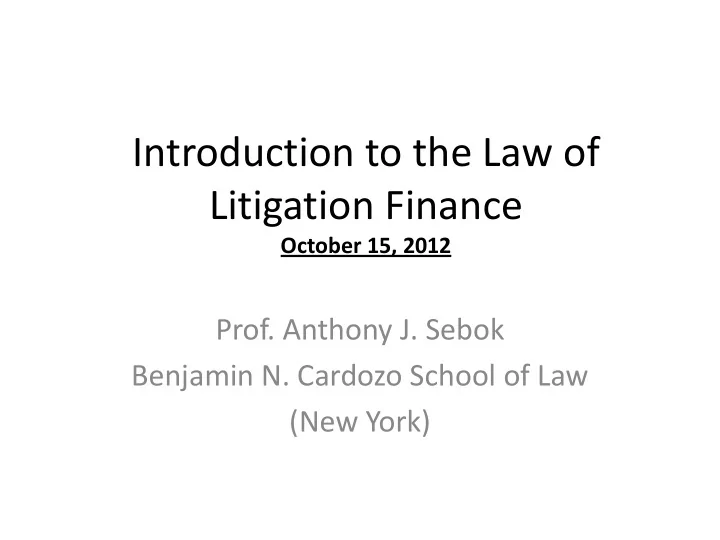

Introduction to the Law of Litigation Finance October 15, 2012 Prof. Anthony J. Sebok Benjamin N. Cardozo School of Law (New York)
Definitions • Maintenance: helping another prosecute a suit • Champerty: maintaining a suit in return for a financial interest in the outcome
Blackstone v. Bentham • Maintenance is . . . • No man of ripe years and of intermeddling in a suit . . . sound mind, acting freely, by maintaining or assisting and with his eyes open, either party with money or ought to be hindered . . . otherwise. . . . These [are] from making such bargain, pests of civil society , that in the way of obtaining are perpetually endeavoring money, as he thinks fit. . . . to disturb the repose of This proposition, were it to their neighbors, and be received, would level . . . officiously interfering in all the barriers which law other men's quarrels. [has] set up . . . . • William Blackstone, 1769 • Jeremy Bentham, 1787
Sorry, Blackstone By 2005 England permitted maintenance for profit (in fact, the current Conservative government now encourages it) . . . . . . along with Australia, Canada, and much of the European Union . . . . . . but the situation in the United States is a little more complicated.
The American Approach: Disagreement • 27 states explicitly permit champerty. • 15 states have explicitly negative law on champerty (in some cases based on 19 th Century statutes or cases). – Usually by declaring litigation finance contracts unenforceable; – Sometimes by allowing defendant to raise litigation finance contract as affirmative defense; – Extremely rarely by making champerty a crime.
Privilege Risks I Attorney-Client Communications Privileged Under the Common- Interest Doctrine What is protected? Communications between “attorneys representing different clients with similar legal • interests.” In re Teleglobe Communications Corp ., 493 F.3d 345, 364 (3d Cir. 2007). Communications between parties that “shared a [common] business interest.” SCM Corp. v. • Xerox Corp. , 70 F.R.D. 508, 514 (D. Conn. 1976). Communications between an “‘agent’ assisting the attorney in giving legal advice to the • client.” Westinghouse Elec. Corp. v. Republic of Philippines , 951 F.2d 1414, 1424 (3d Cir. 1991). This principle was invoked to protect communications between a party and a firm which (a) consulted with the party about the feasibility of obtaining funding and (b) provided the funding. Devon IT, Inc. v. IBM Corp. , 2012 WL 4748160, *1 (E.D.Pa. Sep 27, 2012) (NO. CIV.A. 10-2899).
Privilege Risks II Work Product Privileged Under Fed.R.Civ.P. 26(b)(3) What is protected? “The work product protection applies only to documents ‘prepared in anticipation of litigation.’” Mondis Tech., Ltd. v. LG Elecs., Inc ., No. 2:07-CV-565-TJW-CE, 2011 WL 1714304, at *3 (E.D. Tex. May 4, 2011). Mondis held that materials presented to potential sources of finance for plaintiff’s litigation were considered work product, a position endorsed by the court in Devon .
Ethics Risks ( Per rules of legal ethics based on the MRCP) 1. Certain financial dealings between lawyer and client are limited or prohibited. Rule 1.8(a): Business transactions with client; Rule 1.8(e): Financial assistance to client; Rule 1.8 (i): Acquisition of property interest in litigation. Since litigation finance consists of a financial relationship between client and third party these rules are technically irrelevant. 2. Lawyer’s loyalty to client must be undivided. Rule 1.8(f): Lawyer may not receive payment by third party without client’s consent; Rule 1.6: Lawyer may not reveal confidences to third party without client’s consent. 3. Lawyer may owe duty to client to advise on litigation finance. Rule 1.1: Lawyer must provide competent representation; Rule 1.2: Lawyer may limit scope of representation.
Recommend
More recommend